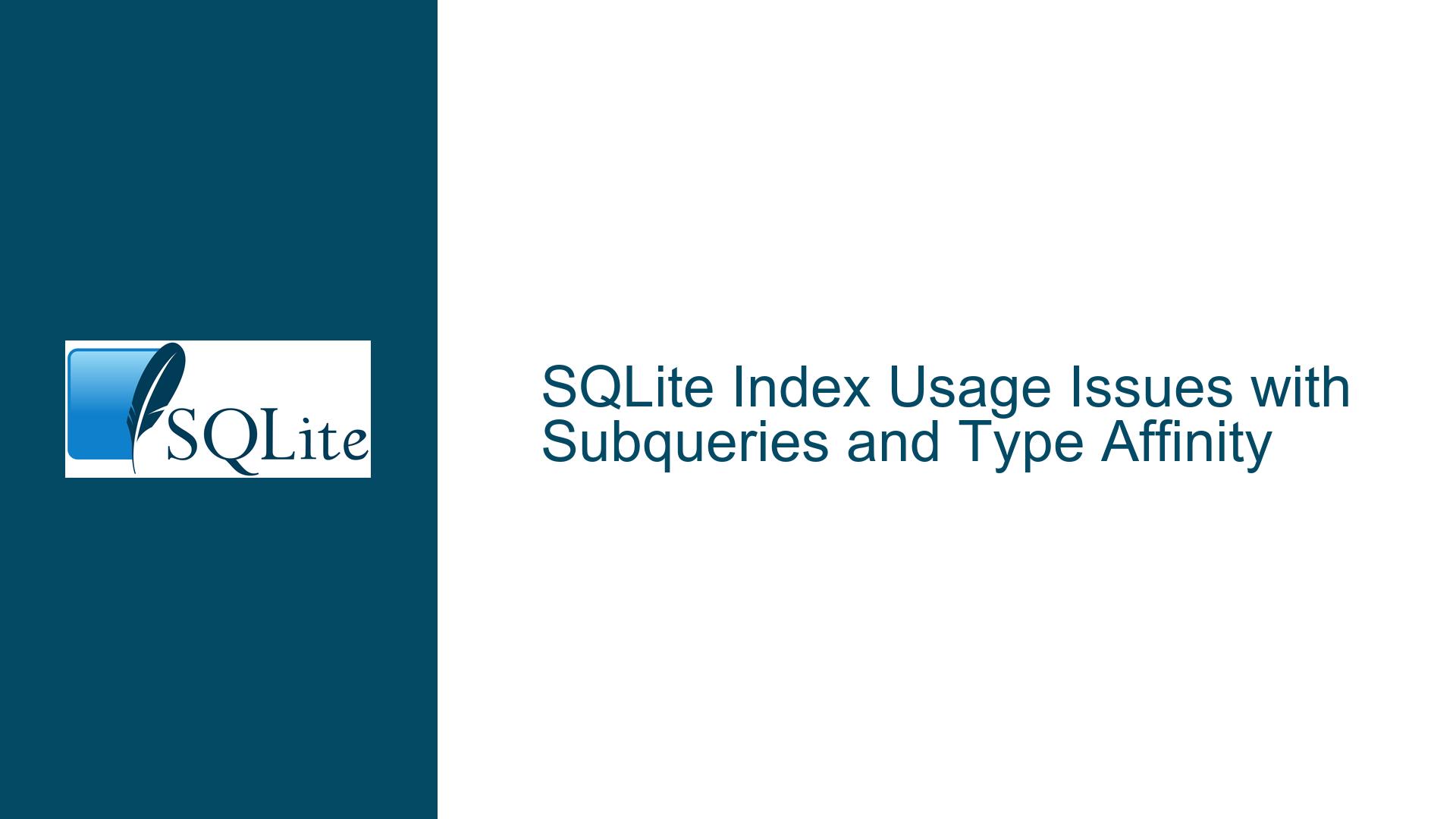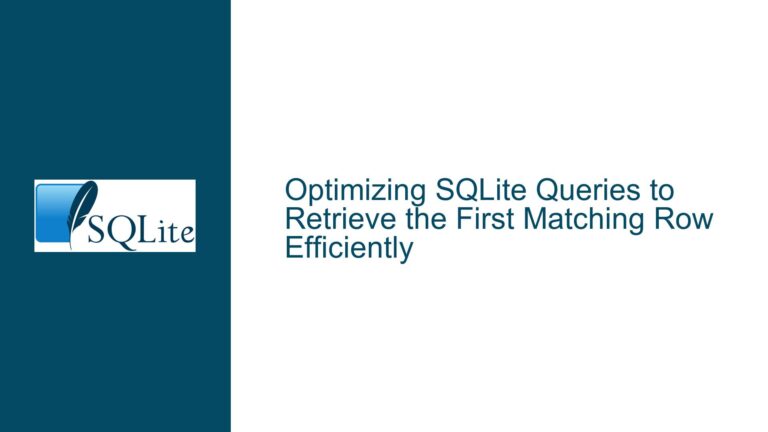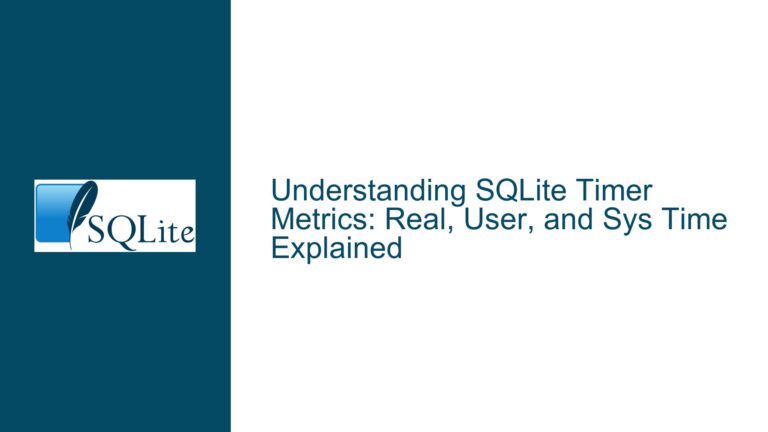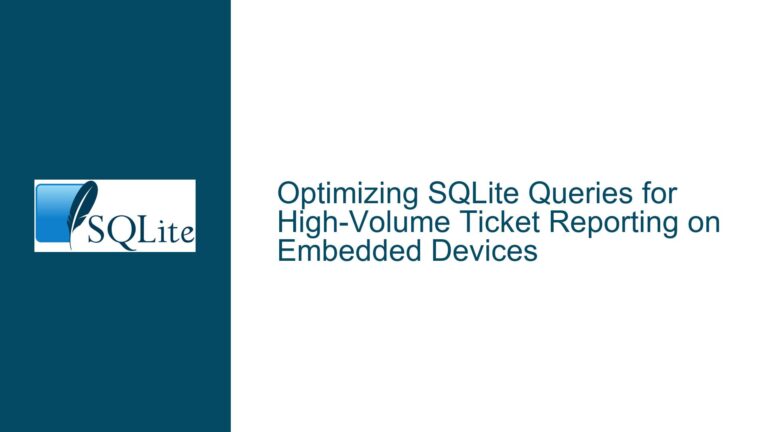SQLite Index Usage Issues with Subqueries and Type Affinity
SQLite Index Ignored Due to Type Affinity Mismatch in Subqueries
When working with SQLite, one of the most common performance optimizations is the proper use of indexes. Indexes allow the database to quickly locate and retrieve rows without scanning the entire table. However, there are scenarios where SQLite may fail to use an index, even when it seems like it should. One such scenario involves subqueries and type affinity mismatches. This issue arises when the type affinity of a column in the index does not match the type affinity of the value being compared, particularly when that value is the result of a subquery.
In the provided scenario, we have two tables: dict and t. The dict table contains a single column field1, while the t table contains three columns: field1, dict1, and dict2. The dict1 column in the t table is a foreign key that references the rowid of the dict table. Additionally, there is a unique constraint on the combination of dict1 and dict2 in the t table, which automatically creates an index on these columns.
The first query, which uses a direct comparison with constants, correctly utilizes the index:
EXPLAIN QUERY PLAN UPDATE t SET field1=1 WHERE dict1=1 AND dict2=2;
The output of the EXPLAIN QUERY PLAN shows that SQLite uses the autoindex on t to efficiently locate the rows to be updated. However, the second query, which uses a subquery to determine the value of dict1, does not use the index:
EXPLAIN QUERY PLAN UPDATE t SET field1=1 WHERE dict1=(SELECT rowid FROM dict WHERE field1='z') AND dict2=2;
In this case, SQLite performs a full table scan on t and executes the subquery separately, resulting in significantly slower performance. The root cause of this behavior lies in the type affinity system of SQLite.
Type Affinity Mismatch Between Subquery Result and Indexed Column
SQLite uses a dynamic type system where the type of a value is associated with the value itself, not the column in which it is stored. However, columns in SQLite have a type affinity, which is a recommended type for the data stored in that column. The type affinity of a column can influence how SQLite compares values and whether it can use an index.
In the scenario described, the dict1 column in the t table has a type affinity of BLOB. This is because the column is defined without an explicit type, and SQLite defaults to BLOB affinity in such cases. The subquery (SELECT rowid FROM dict WHERE field1='z') returns an integer value, which has an INTEGER type affinity. When SQLite compares a BLOB column with an INTEGER value, it cannot efficiently use the index because the index is optimized for BLOB values, and there is no guarantee that the BLOB values in the index can be directly compared with INTEGER values.
The reason for this limitation is that a BLOB column might contain values that look like integers but are stored as strings. For example, the value '1' (a string) is different from 1 (an integer). SQLite cannot efficiently determine whether a BLOB value in the index corresponds to an integer value without converting it, which would require scanning the index, negating the performance benefits of using the index in the first place.
Resolving Type Affinity Mismatch with Explicit Typing or Type Casting
To resolve the issue of the index not being used due to type affinity mismatch, there are two primary solutions: explicitly defining the type of the dict1 column or using type casting to ensure that the subquery result has the same type affinity as the dict1 column.
Explicitly Defining Column Type
The first solution is to explicitly define the dict1 column as an INTEGER when creating the t table. This ensures that the dict1 column has an INTEGER type affinity, which matches the type affinity of the subquery result. Here is how the table creation statement would look:
CREATE TABLE dict(field1);
CREATE TABLE t(field1, dict1 INTEGER REFERENCES dict(rowid), dict2, UNIQUE(dict1, dict2));
With this change, the dict1 column now has an INTEGER type affinity, and the subquery result also has an INTEGER type affinity. As a result, SQLite can efficiently use the index on the dict1 and dict2 columns:
EXPLAIN QUERY PLAN UPDATE t SET field1=1 WHERE dict1=(SELECT rowid FROM dict WHERE field1='z') AND dict2=2;
The output of the EXPLAIN QUERY PLAN will now show that SQLite uses the index, resulting in improved performance.
Using Type Casting with the Unary "+" Operator
The second solution is to use type casting to ensure that the subquery result has a type affinity of NONE, which can be compared with any other type affinity, including BLOB. This can be achieved by prefixing the subquery or the rowid column with the unary "+" operator. The unary "+" operator forces the expression to have a type affinity of NONE, effectively bypassing the type affinity mismatch issue.
Here are two ways to apply this solution:
- Casting the
rowidColumn:
CREATE TABLE dict(field1);
CREATE TABLE t(field1, dict1 REFERENCES dict(rowid), dict2, UNIQUE(dict1, dict2));
EXPLAIN QUERY PLAN UPDATE t SET field1=1 WHERE dict1=(SELECT +rowid FROM dict WHERE field1='z') AND dict2=2;
- Casting the Entire Subquery:
CREATE TABLE dict(field1);
CREATE TABLE t(field1, dict1 REFERENCES dict(rowid), dict2, UNIQUE(dict1, dict2));
EXPLAIN QUERY PLAN UPDATE t SET field1=1 WHERE dict1=+(SELECT rowid FROM dict WHERE field1='z') AND dict2=2;
In both cases, the unary "+" operator ensures that the subquery result has a type affinity of NONE, allowing SQLite to use the index on the dict1 and dict2 columns.
Performance Implications and Best Practices
The choice between explicitly defining the column type and using type casting depends on the specific requirements of your application. Explicitly defining the column type is generally the preferred approach because it makes the schema more self-documenting and ensures consistent behavior across all queries. However, if modifying the schema is not an option, using type casting with the unary "+" operator is a viable alternative.
It is also worth noting that the behavior described in this scenario is specific to SQLite and may not apply to other database systems. SQLite’s dynamic type system and type affinity rules are unique, and understanding these rules is crucial for optimizing query performance.
Conclusion
In summary, the issue of SQLite not using an index in queries involving subqueries can often be traced back to type affinity mismatches. By explicitly defining column types or using type casting, you can ensure that SQLite uses the index efficiently, resulting in improved query performance. Understanding the nuances of SQLite’s type system and how it interacts with indexes is essential for optimizing database performance and avoiding common pitfalls.






